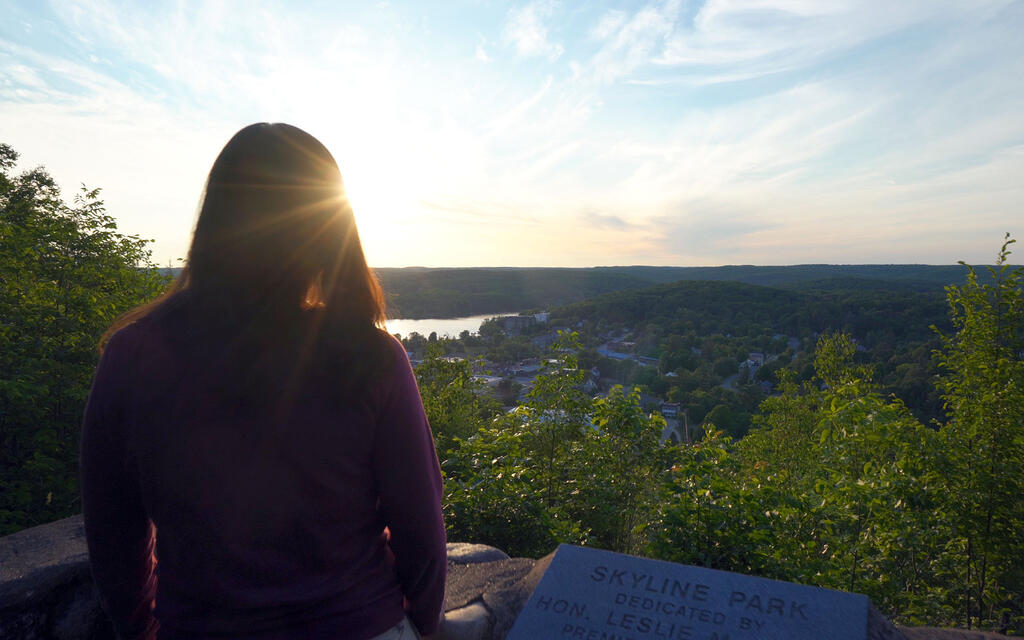When you hike, is it to experience nature? Perhaps catch up with friends? Whether if it’s one or the other – or maybe both! – nothing trumps taking a pause to listen to nature’s ‘music’.
There is beauty is listening to bird songs, frogs’ choruses, and the wind through the trees. In fact, it’s an eco-therapy of sorts, a wonderful invitation to balance out our busy lives, as research tells us that natural sounds improve health, increase positive affect, and lower stress and annoyance.
This series focuses on Responsible Tourism, an overarching term that encompasses safety and environmental impact while exploring our communities and countryside. It means being a good land steward while being respectful of oneself, others, and nature. These travel tips are about bringing out the best in all of us so that our natural environment can keep providing us enjoyment for years to come.
This article takes a closer look at the impact of sounds from a responsible recreation lens.
Be Environmentally Responsible with Sound
Ontario is home to vast wilderness waiting to be explored, but it is also home to some endangered, threatened, and at-risk wildlife. Many parks, conservation areas, and nature/wildlife reserves work hard to protect and nurture environments to help these species survive.
Unfortunately, excessive human noise has the potential to interfere and alter ecological communities. Bird species are particularly vulnerable. Just imagine how, as humans, we have a hard time communicating at loud concerts or construction sites, now imagine how birds, who rely on acoustic communication, experience a disruption when human noise is introduced! It can interfere with mating calls, predator-prey interactions, and nesting species richness.
When spending time outdoors, take the time to listen to nature and see if you can identify the different sounds and songs that naturally surround us.
Consider the Local Community
The fact is, there are good and bad habits in all hiker populations, but everyone wants to get out into nature. A key goal for being a responsible tourist is being considerate of others while we’re hiking.
Easy steps can be taken to ensure everyone enjoys their time in nature. It means saving the music for the car rides rather than the trails. It also means chatting and enjoying nature without producing excessive noise. Just like how it disrupts the ecological environment, it also impacts the experience of other hikers (visitors and locals alike).
Looking back on the Leave No Trace principles, the seventh principal states responsible recreation is about being considerate to other visitors. The outdoors is there for us all the enjoy, so take some time to consider how your actions are affecting someone else’s experience in the outdoors.
Take Responsibility for Your Safety and Self
When it comes to our own safety, there are a few responsible recreation tips when it comes to sounds.
- Don’t hike with earphones in, or at most, only one earphone so that you can maintain situational awareness (hear animals, fast changing weather, other hikers).
- Yell ‘yo bear’ every so often if you’re hiking solo in an area known to have rich bear, coyote, or other populations.
- If you do listen to music, consider turning your phone to airplane mode or carrying an extra battery charger so that you have a means to communicate in an emergency. If there is no cell reception, carrying a GPS Spotter is highly recommended.
- Carry an emergency whistle in the event you require assistance. My favourite being Storm Whistles that you can purchase online. It is extremely loud, weather proof, and should be used in emergencies only.
Maximize Your Sound Experience
Now that we’ve explored the responsible recreation side of sounds in nature, what can we do to enhance our experience?
- Prior to visiting our incredible Ontario Highlands, look up local artists and bands to either enjoy live or to listen to during the car ride.
- Check for First Nations events that are open to the public involving the art of storytelling and music.
- Visit (and listen) global soundscape efforts through Nature Sound Map, Record the Earth, and Center for Global Soundscapes.
- Embrace your inner citizen scientist and record sound observations in nature and upload them to iNaturalist.
Final thought, as one research article states: “The sounds of nature have long generated powerful reactions in human beings—from inspiring music and poetry (e.g., Beethoven’s Pastoral Symphony) to providing the stark symbolism that ignited the environmental movement (e.g., Rachel Carlson’s Silent Spring). Sounds confer a sense of place, connect people to nature, and increasing evidence suggests that natural sounds are important for human health and well-being”.
Looking for more inspiration for connecting to music and creativity in Ontario's Highlands? Click here to learn more about where to find inspiration and creative spaces.








